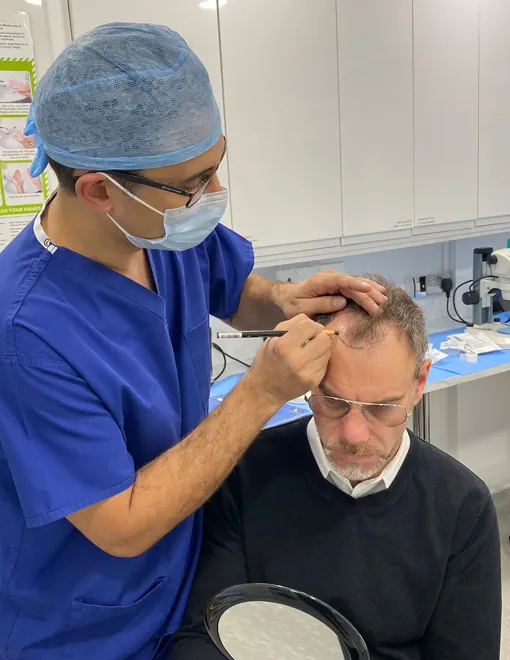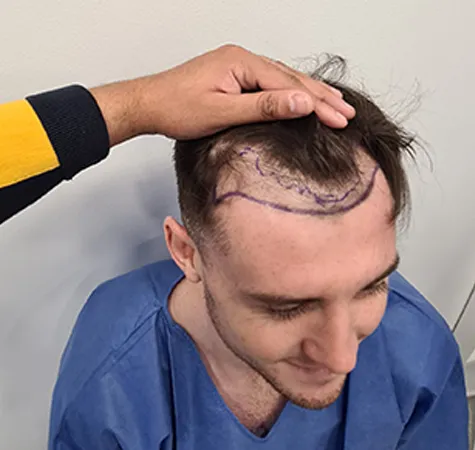Introduction
Hair loss is a concern that affects many, leading to a quest for underlying causes and effective treatments. Among various factors, nutritional deficiencies, particularly iron deficiency, have been scrutinised for their role in hair health. This blog explores the intriguing question: Does a lack of iron lead to hair loss?
Understanding Hair Loss
Hair loss can manifest in various forms, from the gradual thinning of hair to more pronounced balding. While genetics and hormonal changes are well-known culprits, nutritional factors play a significant role too. Iron, a vital nutrient, is crucial for maintaining healthy hair growth, sparking interest in its connection to hair loss.
Role of Iron in the Body
Iron plays an integral role in the body, serving as a cornerstone for various essential functions, particularly those related to blood and oxygen transport. This mineral is a critical component of haemoglobin, the protein in red blood cells responsible for carrying oxygen from the lungs to the rest of the body. Adequate oxygen transport is fundamental for the proper functioning of all body tissues, including hair follicles, which are among the fastest-growing cells in the body.
The health of hair follicles is heavily reliant on a sufficient supply of oxygen and nutrients. Iron’s involvement in oxygen transport directly impacts this supply chain. When hair follicles receive ample oxygen, they are able to maintain a robust growth cycle. This cycle consists of three phases: anagen (growth phase), catagen (transitional phase), and telogen (resting phase). Iron deficiency can disrupt this cycle, particularly the anagen phase, potentially leading to hair loss or thinning as hair follicles enter the resting phase prematurely.
Moreover, iron is involved in other bodily functions that indirectly support hair health. It plays a role in cellular energy production and DNA synthesis, both of which are necessary for hair growth. Iron also supports the immune system, which helps in maintaining a healthy scalp environment, further promoting healthy hair growth.
The presence of adequate iron levels in the body is not just crucial for general health but also specifically for maintaining and promoting healthy hair growth. This underlines the importance of iron in the diet and, where necessary, supplements, to ensure that the body, and by extension the hair follicles, receive the necessary resources for optimal health and function.
Iron Deficiency and Its Symptoms
Iron deficiency is a widespread nutritional concern, and its impact on the body extends beyond the well-known symptoms of fatigue and pale skin. In fact, it can have subtle but significant effects on various bodily functions, including hair growth. Here’s a detailed exploration of iron deficiency and its symptoms, particularly its connection to hair health, presented in point form:
1. Iron Deficiency Overview
Iron deficiency occurs when the body lacks an adequate supply of iron, an essential mineral for numerous bodily functions.
One of its crucial functions is the production of hemoglobin, the protein in red blood cells responsible for carrying oxygen throughout the body.
2. Fatigue and Weakness
General fatigue and weakness are hallmark symptoms of iron deficiency.
Insufficient iron impairs the delivery of oxygen to body tissues, leading to feelings of tiredness and weakness.
3. Pale Skin and Pallor
A noticeable symptom of iron deficiency is the development of pale skin and a pallor, which is often one of the first visible signs.
4. Hair Loss as a Symptom
Hair loss is a lesser-known but significant symptom of iron deficiency.
When the body lacks iron, hair follicle cells may not receive an adequate oxygen supply, disrupting the normal hair growth cycle.
5. Anemia and Hair Health
In severe cases of iron deficiency, anemia can develop.
Anemia reduces the oxygen-carrying capacity of red blood cells, which can have a direct impact on hair follicles, leading to hair loss or thinning.
6. Disrupted Hair Growth
Iron deficiency can interfere with the hair growth cycle, specifically the anagen (growth) phase.
Hair follicles may prematurely enter the telogen (resting) phase, leading to hair loss.
7. Other Symptoms
Apart from fatigue, weakness, pale skin, and hair loss, iron deficiency can manifest as shortness of breath, cold extremities, and an increased susceptibility to infections.
8. Importance of Diagnosis
Diagnosing iron deficiency is crucial for effective treatment.
Medical professionals can perform blood tests to assess iron levels and determine the severity of deficiency.
9. Treating Iron Deficiency
Treatment typically involves iron supplementation, either through dietary changes, oral supplements, or, in severe cases, intravenous iron therapy.
Dietary modifications include incorporating iron-rich foods like red meat, poultry, beans, and leafy greens.
10. Impact on Hair Health
Addressing iron deficiency can restore the oxygen supply to hair follicles, supporting healthy hair growth.
Timely intervention is essential to prevent further hair loss and promote hair regrowth.
Iron deficiency is a multifaceted condition with diverse symptoms, including hair loss. Recognising the signs and seeking professional diagnosis and treatment are essential steps to restore not only overall health but also hair health for those affected by this deficiency.
Scientific Evidence Linking Iron Deficiency to Hair Loss
Scientific research has provided compelling evidence linking iron deficiency to hair loss, particularly in the case of women. This connection is rooted in the fundamental role that iron plays in maintaining healthy hair follicles and supporting the hair growth cycle.
Numerous studies have explored this correlation and found that individuals, particularly women, with iron deficiency are more likely to experience hair loss or thinning. The underlying mechanism behind this phenomenon is relatively straightforward yet significant. Iron deficiency leads to a reduced supply of oxygen to the hair follicles. Since oxygen is a vital component for various cellular processes, including those responsible for hair growth, a deficiency in this crucial element can impede the normal hair growth cycle.
As a result, hair follicles may enter the resting phase prematurely, known as telogen, and this can lead to increased hair shedding and a weakened hair shaft, making the hair more susceptible to falling out. This weakened hair structure further exacerbates the issue of hair loss.
Scientific studies have indeed established a clear and compelling connection between iron deficiency and hair loss, particularly in women. The physiological impact of reduced oxygen supply to hair follicles underscores the critical importance of maintaining adequate iron levels for optimal hair health and growth.
Maintaining healthy iron levels is not only crucial for preventing hair loss but also for supporting overall well-being. Individuals who are experiencing hair loss and suspect iron deficiency should consider seeking professional guidance and treatment options, such as iron supplementation or dietary adjustments.
For those seeking advanced solutions for hair restoration, renowned clinics like the Harley Street Hair Transplant Clinic offer expertise in addressing various hair-related concerns. Their specialised techniques and treatments can provide individuals with effective and lasting solutions to regain their confidence and achieve vibrant, healthy hair.
Diagnosing Iron Deficiency
Diagnosing iron deficiency typically involves blood tests to check iron levels, ferritin (a protein that stores iron), and overall blood health. It’s crucial to consult a healthcare professional for an accurate diagnosis, as self-diagnosing and treating presumed iron deficiency can be harmful.

Image Sources : Zestige Healthcare
Treating Hair Loss Due to Iron Deficiency
Treating hair loss due to iron deficiency is a multifaceted approach that aims to restore not only the body’s iron levels but also the health of hair follicles. Here’s an elaboration of the treatment options for addressing hair loss caused by iron deficiency:
1. Iron Supplements: Iron deficiency can often be corrected with iron supplements prescribed by a healthcare professional. These supplements come in various forms, including ferrous sulfate and ferrous gluconate. The amount and length of time for supplementation will vary based on the extent of the deficiency and personal circumstances.
2. Dietary Modifications: Alongside supplementation, dietary changes play a crucial role in increasing iron intake. Foods rich in iron should be incorporated into the diet. These include leafy green vegetables (like spinach and kale), lean red meat (such as beef and lamb), poultry, fish, beans, lentils, and fortified cereals. Consuming vitamin C-rich foods (like citrus fruits) alongside iron-rich foods can enhance iron absorption.
3. Balanced Nutrition: It’s important to maintain a balanced diet that includes not only iron but also other essential nutrients for hair health, such as proteins, vitamins (particularly biotin and vitamin D), and minerals like zinc.
4. Medical Guidance: Following medical advice is paramount when addressing iron deficiency. Healthcare professionals will assess the severity of the deficiency and tailor treatment accordingly. They will also monitor progress and adjust treatment as needed.
5. Caution Against Excessive Iron: While addressing iron deficiency is crucial, excessive iron intake can have adverse effects. It’s essential to follow medical guidance to avoid iron overload, which can lead to various health complications.
The treatment of hair loss due to iron deficiency involves a comprehensive approach that combines iron supplementation, dietary adjustments, and overall nutritional support. Seeking professional medical guidance is vital to ensure safe and effective treatment. By restoring iron levels and promoting a balanced diet, individuals can address the root cause of hair loss and support the regrowth of healthy and vibrant hair.
Conclusion
In summary, while iron deficiency can be a contributing factor to hair loss, it’s one of many potential causes. For those exploring hair restoration options, treatments such as hair transplant london are available. At Zestige Private Healthcare, we understand the complex nature of hair loss and are dedicated to providing comprehensive care, including guidance on nutritional factors and advanced hair restoration solutions.








